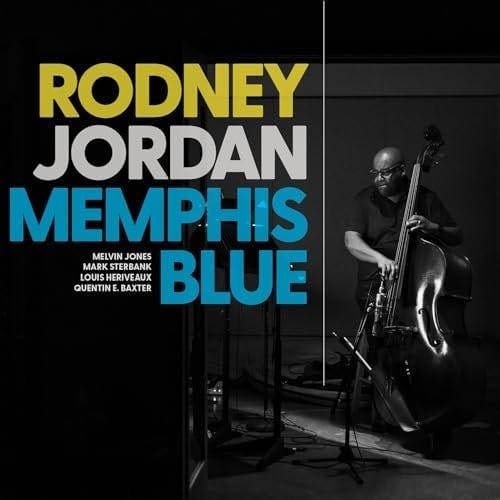Rodney Jordan - Memphis Blue
(Baxter Music Enterprises, 2025)
Memphis, TN as only a rock and rhythm & blues hub? What about jazz? What about Lil Hardin Armstrong, W. C. Handy, Booker Little, Harold Mabern, and Phineas Newborn Jr.? Memphis continues to produce and nurture jazz talent. There is the recent release of Jazz Ensemble Of Memphis’ Playing In The Yard (Memphis International Records, 2024). Now, Memphis native bassist Rodney Jordan (now in Tallahassee, FL) joins with his hometown trumpeter Melvin Jones, Atlanta-native pianist Louis Heriveaux, Charlestonians, saxophonist Mark Sterbank and Drummer Quentin E. Baxter. The quintet presents Memphis Blue, a collection of five original compositions by band members and three unlikely “standards.”
Despite the album title, this is not a blues recording, but a collection infused with that spirit. The album is music driven on the back of a smooth groove. Not that pejorative-singed mongrel smooth jazz, though it has its place, but something more refined and challenging, daring the listener to seek its truths unexposed. Trumpeter Jones provides the disc opener, “This Storm Will Pass.” Described as “briskly burning,” it is best described as the emotional idée fixe characterizing the rest of the album. It is that vibe thread pulled through Handy, Sam Phillips and Sun Studios, Jim Stewart, Estelle Axton and Stax Records, Willie Mitchell’s Hi Records, Ardent and American Recording Studios, blues, rockabilly, rhythm & blues, and hot buttered soul. This is not white hot music, it is that warm room on a chilly day in the south.
Gigi Gryce’s “Minority,” from that composer’s Gigi Gryce Quartet featuring Clifford Brown in Paris, recorded in France on October 8, 1953, resulting in its simultaneous release on the 10-inch LPs Gigi Gryce - Clifford Brown Sextet (Vogue LD 175) and Gigi Gryce Clifford Brown Sextet (Blue Note BLP 504). Why so much information? Memphis Blue plumbs deep, filtering through the prism of history. The band performs this hard bop piece gently with a nosebleed swing. The quintet performs the song as if part of a 1960s “cooking session” where a head introduces the song and is followed by each member soloing.
Jordan supplies two homages, “Hargrove” for late jazz polymath, Roy Hargrove, and “The Art Of Blakey.” Each reflects the zeitgeist of each artist. The former is tuneful and hip, complex contemporary, while the latter is Jazz Messengers tinged and swinging. Jordan envisioned a light treatment of Mulgrew Miller’s “Small Portion” and the results were provocative, with spirited solos by Jones and Sterbank. The most curiously effective performance on the album is the stripped-to-the-studs “Autumn Leaves.” Jordan’s spare arrangement provides an x-ray of the standard’s interior, images bouncing off each instrument in solo conversation. Jordan brings the song into the basement of Miles Davis’ concept.


